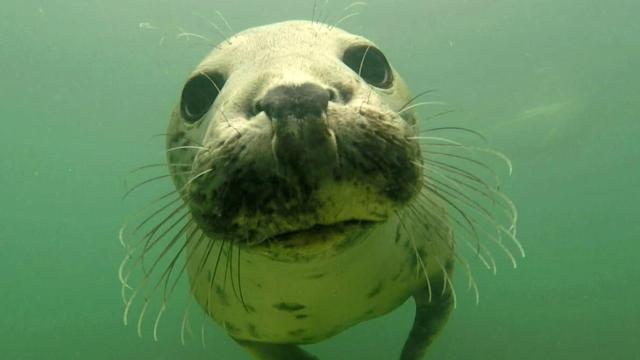Unprecedented video shows a male grey seal using its flippers to produce a loud sound underwater. Scientists say it could be a previously undocumented form of communication, in which the seals are using the sound to attract mates or ward off rivals.
Underwater communication among aquatic mammals is typically associated with vocal sounds, such as clicks and whistles, but new research published in Marine Mammal Science highlights another form of signalling in seals: underwater clapping.
The grey seals make the sound by quickly bringing their pectoral flippers together, which results in a surprisingly loud snapping sound. The newly documented behaviour appears to be exclusive to males, who seem to only do it during breeding season. The authors of the new paper, lead by marine biologist David Hocking from Monash University in Australia, say the claps are likely a show of strength, serving the purpose of warding off potential rivals and indicating reproductive fitness.
“Think of a chest-beating male gorilla, for example,” said Hocking in a statement. “Like seal claps, those chest beats carry two messages: I am strong, stay away; and I am strong, my genes are good.”
Clapping seals are obviously nothing new, as captive individuals can be taught to clap their flippers on command, as is often the case at aquatic theme parks. But the grey seals in this study were wild, and they performed this behaviour spontaneously. Ben Burville, a researcher from Newcastle University and a co-author of the study, captured rare footage of a male making the clapping sounds off the coast of Farne Islands in northeast England in 2017.
“The clap was incredibly loud and at first I found it hard to believe what I had seen,” said Burville in the statement. “How could a seal make such a loud clap underwater with no air to compress between its flippers?”
The male was seen swimming in the vicinity of a female prior to him making the clapping noise. Other males were also seen swimming nearby. The video captured by Burville is the only visual/acoustic record of the behaviour, but similar clapping events have been anecdotally chronicled by the team on five different occasions, including more than 20 clapping events over a 20-year span. Documenting the clapping behaviour has been difficult due to its “rapid nature and usually sudden onset,” as the authors wrote in the paper.
The sounds last less than a tenth of a second and can reach frequencies above 10 kilohertz, according to the paper. The claps rarely number more than one or two at a time, and they tend to be directed at other seals nearby. The researchers “cannot exclude the possibility that clapping may also have been directed at the diver,” they wrote in the paper, “however, its constant association with the presence of other seals and frequent occurrence even when the diver is out of sight make this interpretation unlikely.” That said, the scientists said additional observations will be required to confirm their findings and to support their assertion that this “underwater percussive signalling,” as they call it, is employed by other groups of grey seals.
As the researchers point out in their paper, other aquatic mammals, such as harbour seals and humpback whales, slap their pectoral fins on the water to intimidate rivals and attract mates. The underwater claps employed by the grey seals, however, have the distinctive advantage of being heard both above and below the surface of the water, according to the authors.
This is a neat study, and more fieldwork will help to flesh out these exciting new findings. Sadly, future work will also have to determine the extent to which noise pollution from ships and other human activities might be negatively impacting the grey seals and their ability to mate.
